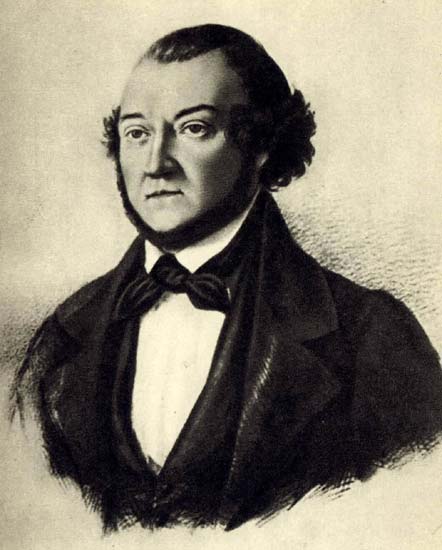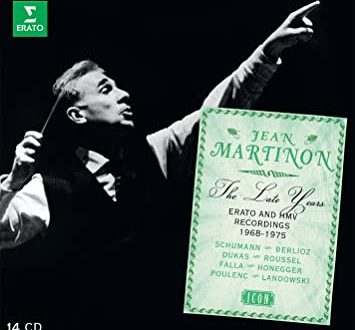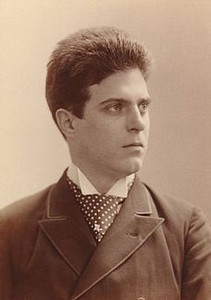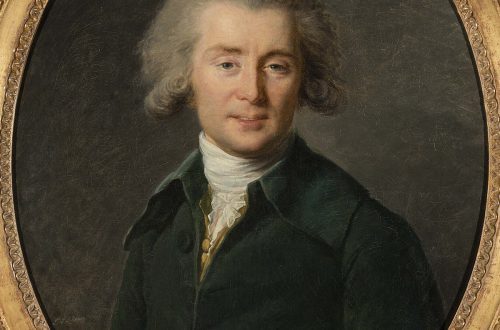
Alexander Alexandrovich Alyabyev (Alexander Alyabyev) |
Alexander Alyabyev
… Everything native is closer to the heart. The heart feels alive Well, sing along, well, begin: My nightingale, my nightingale! V. Domontovych
This talent was curious in terms of spiritual sensitivity and compliance with the needs of many human hearts that beat in tune with Alyabyev’s melodies … He coexisted with the diversity of observations of the mind, almost a “feuilletonist from music”, with an insight into the needs of the hearts of his contemporaries … B. Asafiev
There are composers who gain fame and immortality thanks to a single work. Such is A. Alyabyev – the author of the famous romance “The Nightingale” to the verses of A. Delvig. This romance is sung all over the world, poems and stories are dedicated to it, it exists in concert adaptations by M. Glinka, A. Dubuc, F. Liszt, A. Vietana, and the number of its nameless transcriptions is unlimited. However, in addition to the Nightingale, Alyabyev left a great legacy: 6 operas, ballet, vaudeville, music for performances, a symphony, overtures, compositions for a brass band, numerous choral, chamber instrumental works, more than 180 romances, arrangements of folk songs. Many of these compositions were performed during the composer’s lifetime, they were successful, although few were published – romances, several piano pieces, the melodrama “The Prisoner of the Caucasus” by A. Pushkin.
The fate of Alyabyev is dramatic. For many years he was cut off from the musical life of the capital cities, lived and died under the yoke of a grave, unjust accusation of murder, which broke his life on the threshold of his fortieth birthday, dividing his biography into two contrasting periods. The first one went well. Childhood years were spent in Tobolsk, whose governor was Alyabyev’s father, an enlightened, liberal man, a great lover of music. In 1796, the family moved to St. Petersburg, where at the age of 14 Alexander was enrolled in the service of the mining department. At the same time, serious music studies began with I. Miller, the “famous counterpoint player” (M. Glinka), from whom many Russian and foreign musicians studied composition. Since 1804, Alyabyev has been living in Moscow, and here in the 1810s. his first compositions were published – romances, piano pieces, the First String Quartet was written (first published in 1952). These compositions are perhaps the earliest examples of Russian chamber instrumental and vocal music. In the romantic soul of the young composer, the sentimental poetry of V. Zhukovsky found a special response then, later giving way to the poems of Pushkin, Delvig, the Decembrist poets, and at the end of his life – N. Ogarev.
The Patriotic War of 1812 relegated musical interests to the background. Alyabyev volunteered for the army, fought alongside the legendary Denis Davydov, was wounded, awarded two orders and a medal. The prospect of a brilliant military career opened up before him, but, not feeling eager for it, Alyabyev retired in 1823. Living alternately in Moscow and St. Petersburg, he became close to the artistic world of both capitals. In the house of the playwright A. Shakhovsky, he met with N. Vsevolozhsky, the organizer of the Green Lamp literary society; with I. Gnedich, I. Krylov, A. Bestuzhev. In Moscow, at the evenings with A. Griboyedov, he played music with A. Verstovsky, the Vielgorsky brothers, V. Odoevsky. Alyabyev participated in concerts as a pianist and singer (a charming tenor), composed a lot and gained more and more authority among musicians and music lovers. In the 20s. vaudevilles by M. Zagoskin, P. Arapov, A. Pisarev with music by Alyabyev appeared on the stages of Moscow and St. Petersburg theaters, and in 1823 in St. Petersburg and Moscow, his first opera, Moonlit Night, or Brownies, was staged with great success (libre. P. Mukhanov and P. Arapova). … Alyabyev’s operas are no worse than French comic operas, – Odoevsky wrote in one of his articles.
On February 24, 1825, disaster struck: during a card game in Alyabyev’s house, there was a major quarrel, one of its participants soon died suddenly. In a strange way, Alyabyev was blamed for this death and, after a three-year trial, was exiled to Siberia. Long-term wanderings began: Tobolsk, the Caucasus, Orenburg, Kolomna …
…Your will taken away, The cage is firmly locked Oh, sorry, our nightingale, Loud nightingale… Delvig wrote.
“… Do not live as you want, but as God commands; no one has experienced so much as I, a sinner … ”Only sister Ekaterina, who voluntarily followed her brother into exile, and her favorite music saved from despair. In exile, Alyabyev organized a choir and performed in concerts. Moving from one place to another, he recorded songs of the peoples of Russia – Caucasian, Bashkir, Kyrgyz, Turkmen, Tatar, used their tunes and intonations in his romances. Together with the Ukrainian historian and folklorist M. Maksimovich Alyabiev compiled a collection of “Voices of Ukrainian Songs” (1834) and constantly composed. He wrote music even in prison: while under investigation, he created one of his best quartets – the Third, with variations on the Nightingale theme in the slow part, as well as the Magic Drum ballet, which did not leave the stages of Russian theaters for many years.
Over the years, autobiographical features appeared more and more clearly in Alyabyev’s work. The motives of suffering and compassion, loneliness, homesickness, the desire for freedom – these are the characteristic circle of images of the period of exile (romances “Irtysh” on the st. I. Vetter – 1828, “Evening Bells”, on the st. I. Kozlov (from T. Mura) – 1828, “Winter road” at Pushkin station – 1831). Strong mental confusion was caused by an accidental meeting with a former lover E. Ofrosimova (nee Rimskaya-Korsakova). Her image inspired the composer to create one of the best lyrical romances “I loved you” on st. Pushkin. In 1840, having become a widower, Ofrosimova became the wife of Alyabyev. In the 40s. Alyabyev became close to N. Ogarev. In the romances created on his poems – “The Tavern”, “The Hut”, “The Village Watchman” – the theme of social inequality first sounded, anticipating the searches of A. Dargomyzhsky and M. Mussorgsky. Rebellious moods are also characteristic of the plots of Alyabyev’s last three operas: “The Tempest” by W. Shakespeare, “Ammalat-bek” by A. Bestuzhev-Marlinsky, “Edwin and Oscar” by ancient Celtic legends. So, although, according to I. Aksakov, “summer, illness and misfortune calmed him down,” the rebellious spirit of the Decembrist era did not fade away in the composer’s works until the end of his days.
O. Averyanova





